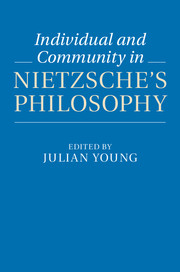
- Cited by 2
-
Cited byCrossref Citations
This Book has been cited by the following publications. This list is generated based on data provided by Crossref.
2015. Books Received. Philosophy, Vol. 90, Issue. 1, p. 167.
Slama, Paul 2020. Protagoras, Nietzsche, Heidegger : de l’histoire de l’être à l’histoire des valeurs. Méthodos,
- Publisher:
- Cambridge University Press
- Online publication date:
- September 2014
- Print publication year:
- 2014
- Online ISBN:
- 9781107279254




